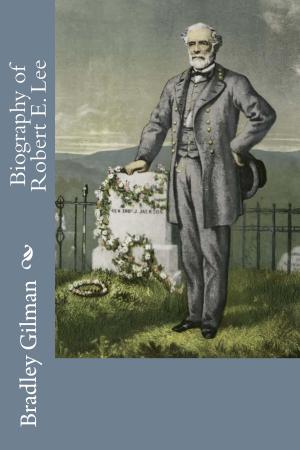Santa Claus Anthology #1
A Captured Santa Claus, A Kidnapped Santa Claus, A Defective Santa Claus
Fiction & Literature, Anthologies, Short Stories| Author: | Thomas Nelson Page, L. Frank Baum, James Whitcomb Riley | ISBN: | 1230002611150 |
| Publisher: | Steve Gabany | Publication: | October 3, 2018 |
| Imprint: | Language: | English |
| Author: | Thomas Nelson Page, L. Frank Baum, James Whitcomb Riley |
| ISBN: | 1230002611150 |
| Publisher: | Steve Gabany |
| Publication: | October 3, 2018 |
| Imprint: | |
| Language: | English |
Three charming Christmas tales sure to bring a smile to the whole family.
#1: A Captured Santa Claus
by Thomas Nelson Page
The setting is the countryside around Richmond, Virginia. The time is 1863, the middle of the United States Civil War. The Stafford family is aligned with the Confederacy, and the father, Major Stafford, is away fighting on Christmas Day. The Union Army has blockaded the area around the Stafford homestead, making Christmas shopping impossible.
The Major manages to get home before Christmas Day ends, but he has no presents, either. His three children, however, are unfazed, assuring him that Santa Claus is going to bring them everything they want next Christmas.
Throughout the year then-Colonel Stafford buys Christmas presents, but has no hope of delivering them through the Union lines in his Confederate uniform. He devises a plan to sneak through the lines dressed in civilian clothes, but is spotted, labeled a spy, and, even though he makes it home, the chase is on, and the outcome is not at all certain.
Thomas Nelson Page (April 23, 1853 – November 1, 1922) was a lawyer and American writer. He also served as the U.S. ambassador to Italy under the administration of President Woodrow Wilson during World War I.
Born at Oakland, one of the Nelson family plantations, in the village of Beaverdam in Hanover County, Virginia to John Page, a lawyer and a plantation owner, and Elizabeth Burwell (Nelson). He was a scion of the prominent Nelson and Page families, each First Families of Virginia. Although he was from once-wealthy lineage, after the American Civil War, which began when he was only 8 years old, his parents and their relatives were largely impoverished during Reconstruction and his teenage years.
Page wrote many novels and short stories that romanticized the condition of the South after the Civil War.
---------------------------------
#2: A Kidnapped Santa Claus
by L. Frank Baum
This is a very short story, perfect for bedtime.
The story opens with a quick overview of Santa's castle in the Laughing Valley. Its focus soon switches to the five Caves of the Daemons in nearby mountains. These creatures are not necessarily evil. Four of the five, the Daemons of Selfishness, Envy, Hatred, and Malice, certainly are bad, but the fifth, the Daemon of Repentance, is a more ambiguous figure.
The Daemons of the Caves resent Santa Claus because children under the influence of his gifts rarely visit their caves. They decide to frustrate his efforts and counter his influence. (The Daemon of Repentance goes along with the plan, since children cannot reach his remote cave without passing through the caves of his compatriots beforehand.) The Daemons first try to tempt Santa Claus to their own vices; they visit him one by one, and attempt to lure him into selfishness, envy, and hatred. Santa Claus merely laughs at their clumsy efforts. Failing at temptation, the Daemons instead kidnap Santa Claus; they lasso him as he is riding in his sleigh on Christmas Eve, and bind him in their caverns.
Santa Claus is accompanied on his rounds by a fairy, pixie, knook, and ryl, who travel under the seat of his sleigh; once the four realize that Santa is gone, they endeavor to complete his mission and deliver the gifts. They generally succeed, though with some mistakes; they deliver a toy drum to a little girl and a sewing kit to a little boy. Overall, though, they manage to save Christmas. Then they report Santa's absence; the queen of the fairies in the Forest of Burzee knows what has happened. An army of magical creatures is mustered to rescue the missing hero. Meanwhile, though, Santa is released from captivity by the Daemon of Repentance, who has repented the kidnapping. Santa meets the army on its way, and turns it back from attacking the daemons.
L. Frank Baum was an American author chiefly known for his children's books, particularly The Wonderful Wizard of Oz. He wrote thirteen novel sequels, nine other fantasy novels, and a host of other works (55 novels in total, plus four "lost works", 83 short stories, over 200 poems, an unknown number of scripts, and many miscellaneous writings), and made numerous attempts to bring his works to the stage and screen. His works anticipated such century-later commonplaces as television, augmented reality, laptop computers (The Master Key), wireless telephones (Tik-Tok of Oz), women in high risk, action-heavy occupations (Mary Louise in the Country), and the ubiquity of advertising on clothing (Aunt Jane's Nieces at Work). Source: Wikipedia
---------------------------------
#3: A Defective Santa Claus
by James Whitcomb Riley
This is a short story/poem written in the fun dialect of a young boy that is sure to be enjoyed by all ages. It tells about a father who pretends he has to be away on Christmas Eve in order to play Santa Claus and surprise his children. However, his plan backfires, literally.
James Whitcomb Riley (October 7, 1849 – July 22, 1916) was an American writer, poet, and best-selling author. During his lifetime he was known as the "Hoosier Poet" and "Children's Poet" for his dialect works and his children's poetry respectively. His poems tended to be humorous or sentimental, and of the approximately one thousand poems that Riley authored, the majority are in dialect. His famous works include "Little Orphant Annie" and "The Raggedy Man".
In about 1880, Riley was diagnosed with Bell's palsy. Although he recovered to continue writing, he was stricken with it again in March, 1909. He recovered enough to be able to walk, but had to dictate his final poems and short autobiographical sketches.
On July 22, 1916, Riley suffered a second stroke. He recovered enough during the day to speak and joke with his companions, but died before dawn the next morning, July 23. Source: Wikipedia.
Three charming Christmas tales sure to bring a smile to the whole family.
#1: A Captured Santa Claus
by Thomas Nelson Page
The setting is the countryside around Richmond, Virginia. The time is 1863, the middle of the United States Civil War. The Stafford family is aligned with the Confederacy, and the father, Major Stafford, is away fighting on Christmas Day. The Union Army has blockaded the area around the Stafford homestead, making Christmas shopping impossible.
The Major manages to get home before Christmas Day ends, but he has no presents, either. His three children, however, are unfazed, assuring him that Santa Claus is going to bring them everything they want next Christmas.
Throughout the year then-Colonel Stafford buys Christmas presents, but has no hope of delivering them through the Union lines in his Confederate uniform. He devises a plan to sneak through the lines dressed in civilian clothes, but is spotted, labeled a spy, and, even though he makes it home, the chase is on, and the outcome is not at all certain.
Thomas Nelson Page (April 23, 1853 – November 1, 1922) was a lawyer and American writer. He also served as the U.S. ambassador to Italy under the administration of President Woodrow Wilson during World War I.
Born at Oakland, one of the Nelson family plantations, in the village of Beaverdam in Hanover County, Virginia to John Page, a lawyer and a plantation owner, and Elizabeth Burwell (Nelson). He was a scion of the prominent Nelson and Page families, each First Families of Virginia. Although he was from once-wealthy lineage, after the American Civil War, which began when he was only 8 years old, his parents and their relatives were largely impoverished during Reconstruction and his teenage years.
Page wrote many novels and short stories that romanticized the condition of the South after the Civil War.
---------------------------------
#2: A Kidnapped Santa Claus
by L. Frank Baum
This is a very short story, perfect for bedtime.
The story opens with a quick overview of Santa's castle in the Laughing Valley. Its focus soon switches to the five Caves of the Daemons in nearby mountains. These creatures are not necessarily evil. Four of the five, the Daemons of Selfishness, Envy, Hatred, and Malice, certainly are bad, but the fifth, the Daemon of Repentance, is a more ambiguous figure.
The Daemons of the Caves resent Santa Claus because children under the influence of his gifts rarely visit their caves. They decide to frustrate his efforts and counter his influence. (The Daemon of Repentance goes along with the plan, since children cannot reach his remote cave without passing through the caves of his compatriots beforehand.) The Daemons first try to tempt Santa Claus to their own vices; they visit him one by one, and attempt to lure him into selfishness, envy, and hatred. Santa Claus merely laughs at their clumsy efforts. Failing at temptation, the Daemons instead kidnap Santa Claus; they lasso him as he is riding in his sleigh on Christmas Eve, and bind him in their caverns.
Santa Claus is accompanied on his rounds by a fairy, pixie, knook, and ryl, who travel under the seat of his sleigh; once the four realize that Santa is gone, they endeavor to complete his mission and deliver the gifts. They generally succeed, though with some mistakes; they deliver a toy drum to a little girl and a sewing kit to a little boy. Overall, though, they manage to save Christmas. Then they report Santa's absence; the queen of the fairies in the Forest of Burzee knows what has happened. An army of magical creatures is mustered to rescue the missing hero. Meanwhile, though, Santa is released from captivity by the Daemon of Repentance, who has repented the kidnapping. Santa meets the army on its way, and turns it back from attacking the daemons.
L. Frank Baum was an American author chiefly known for his children's books, particularly The Wonderful Wizard of Oz. He wrote thirteen novel sequels, nine other fantasy novels, and a host of other works (55 novels in total, plus four "lost works", 83 short stories, over 200 poems, an unknown number of scripts, and many miscellaneous writings), and made numerous attempts to bring his works to the stage and screen. His works anticipated such century-later commonplaces as television, augmented reality, laptop computers (The Master Key), wireless telephones (Tik-Tok of Oz), women in high risk, action-heavy occupations (Mary Louise in the Country), and the ubiquity of advertising on clothing (Aunt Jane's Nieces at Work). Source: Wikipedia
---------------------------------
#3: A Defective Santa Claus
by James Whitcomb Riley
This is a short story/poem written in the fun dialect of a young boy that is sure to be enjoyed by all ages. It tells about a father who pretends he has to be away on Christmas Eve in order to play Santa Claus and surprise his children. However, his plan backfires, literally.
James Whitcomb Riley (October 7, 1849 – July 22, 1916) was an American writer, poet, and best-selling author. During his lifetime he was known as the "Hoosier Poet" and "Children's Poet" for his dialect works and his children's poetry respectively. His poems tended to be humorous or sentimental, and of the approximately one thousand poems that Riley authored, the majority are in dialect. His famous works include "Little Orphant Annie" and "The Raggedy Man".
In about 1880, Riley was diagnosed with Bell's palsy. Although he recovered to continue writing, he was stricken with it again in March, 1909. He recovered enough to be able to walk, but had to dictate his final poems and short autobiographical sketches.
On July 22, 1916, Riley suffered a second stroke. He recovered enough during the day to speak and joke with his companions, but died before dawn the next morning, July 23. Source: Wikipedia.















